D.A. Cairns's Blog, page 50
April 9, 2014
H is for Hardhearted.
H is for Hardhearted
“‘No! No!No!’ protested Jenny. ‘All my girls have visa. Or Australian citizen.’
The stony faced officer repeated his assertion that Roses are Red, of which she was the manager, was being investigated for conducting a business involving sexual servitude, and of employing and exploiting non-citizens in breach of the visas, and in contravention of Australia’s immigration laws.’
‘What is servitude?’
‘Slavery.’
‘No slave! Girls like sex.’
‘Are you going to cooperate with our investigation or am I going to have to arrest you?’
‘No arrest. I do nothing wrong.’
Jenny and the officer held each other’s gaze as they engaged in a battle of wills.”From chapter 14, Ashmore Grief
 It is so easy to judge. We make assessments of people and situations all the time, often subconsciously: filtering them through the lenses of our preconceived ideas and our dearly beloved worldviews of which again most people are unaware. We have this urgent propensity to categorizeand to label. Even as we describe ourselves as open-minded and generous, we readily demonstrate bigotry and parsimony. We can be selectively narrow minded and stingy, and while we happily think of ourselves as good people, we may only require the wrong set of circumstances, to manifest darkness.
It is so easy to judge. We make assessments of people and situations all the time, often subconsciously: filtering them through the lenses of our preconceived ideas and our dearly beloved worldviews of which again most people are unaware. We have this urgent propensity to categorizeand to label. Even as we describe ourselves as open-minded and generous, we readily demonstrate bigotry and parsimony. We can be selectively narrow minded and stingy, and while we happily think of ourselves as good people, we may only require the wrong set of circumstances, to manifest darkness.
We kid ourselves if we think we are incapable of behaving the same way as the various objects of our scorn and disapproval. Life is very complicated but our solutions to the many problems which assail us testify of our naivety. We use band-aids to treat cancer. Honesty, mercy, generosity and self sacrifice surprise us. The soft and open hearted are seen as weaklings, so we cultivate hard heartedness.
Protection is the justification for hard heartedness, and fear underpins it. Those who are different from me, somehow pose a threat to me, so I must defend myself, my people and my territory. Ashmore Grief is the story of the fight to overcome coldness and prejudice. One of the most profound statements in the Bible is this: mercy triumphs over judgment.
What was your initial reaction to the above excerpt from Ashmore Grief?
Photo source:http://halyork.blogspot.com.au/
“‘No! No!No!’ protested Jenny. ‘All my girls have visa. Or Australian citizen.’
The stony faced officer repeated his assertion that Roses are Red, of which she was the manager, was being investigated for conducting a business involving sexual servitude, and of employing and exploiting non-citizens in breach of the visas, and in contravention of Australia’s immigration laws.’
‘What is servitude?’
‘Slavery.’
‘No slave! Girls like sex.’
‘Are you going to cooperate with our investigation or am I going to have to arrest you?’
‘No arrest. I do nothing wrong.’
Jenny and the officer held each other’s gaze as they engaged in a battle of wills.”From chapter 14, Ashmore Grief
 It is so easy to judge. We make assessments of people and situations all the time, often subconsciously: filtering them through the lenses of our preconceived ideas and our dearly beloved worldviews of which again most people are unaware. We have this urgent propensity to categorizeand to label. Even as we describe ourselves as open-minded and generous, we readily demonstrate bigotry and parsimony. We can be selectively narrow minded and stingy, and while we happily think of ourselves as good people, we may only require the wrong set of circumstances, to manifest darkness.
It is so easy to judge. We make assessments of people and situations all the time, often subconsciously: filtering them through the lenses of our preconceived ideas and our dearly beloved worldviews of which again most people are unaware. We have this urgent propensity to categorizeand to label. Even as we describe ourselves as open-minded and generous, we readily demonstrate bigotry and parsimony. We can be selectively narrow minded and stingy, and while we happily think of ourselves as good people, we may only require the wrong set of circumstances, to manifest darkness.We kid ourselves if we think we are incapable of behaving the same way as the various objects of our scorn and disapproval. Life is very complicated but our solutions to the many problems which assail us testify of our naivety. We use band-aids to treat cancer. Honesty, mercy, generosity and self sacrifice surprise us. The soft and open hearted are seen as weaklings, so we cultivate hard heartedness.
Protection is the justification for hard heartedness, and fear underpins it. Those who are different from me, somehow pose a threat to me, so I must defend myself, my people and my territory. Ashmore Grief is the story of the fight to overcome coldness and prejudice. One of the most profound statements in the Bible is this: mercy triumphs over judgment.
What was your initial reaction to the above excerpt from Ashmore Grief?
Photo source:http://halyork.blogspot.com.au/
Published on April 09, 2014 00:37
April 8, 2014
G is for Gypsy
G is for Gypsy
“As was his habit and his discreet pleasure when in Sydney, Senator Wittaya Keawwanna entered The Lotus Suite at 10pm accompanied by his minder, the ever reliable and intimidating looking Gypsy. After a long day of meetings and public appearances, he needed to unwind. The madame smiled her million dollar smile and pretended not to recognize her distinguished guest. Gypsy paid the woman one hundred and fifty dollars in cash as Wittaya started down the hall. On reaching its terminus, he turned left and climbed a set of creaky stairs which were decorated with rich red carpet. At the top of the stairs stood Wittaya’s appointment.
‘Hi Amy,’ he said as he neared her petite frame and strained to inhale her perfume. She wore a sheer black Babydoll over a red fishnet bodystocking. As alluring as her attire was, Wittaya focused on her pretty face and returned her smile. When he reached her on the landing, she took his hand and led him into a room. Gypsy followed to the top of the stairs where he would remain vigilant until the Senator’s appointment was over. Wittaya nodded at Gypsy who reciprocated.” –from chapter 9, Ashmore Grief
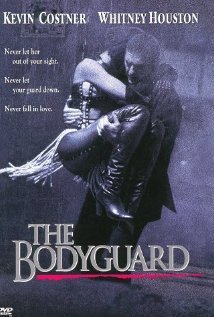 Ever since I saw The Bodyguard, (four times before it left the cinema and countless times since), I have marveled at the imagery the film provides of a man who is dedicated solely, and obsessively to the one he is employed to protect. Costner’s character, Frank Farmer, has no life outside of his work. He lives to protect others. Farmer would happily die to save his employer because duty is all he knows. I find the whole idea of bodyguards intriguing.
Ever since I saw The Bodyguard, (four times before it left the cinema and countless times since), I have marveled at the imagery the film provides of a man who is dedicated solely, and obsessively to the one he is employed to protect. Costner’s character, Frank Farmer, has no life outside of his work. He lives to protect others. Farmer would happily die to save his employer because duty is all he knows. I find the whole idea of bodyguards intriguing.
In Ashmore Grief, Gypsy is a vague, shadowy character and is intended to be so. He’s very important to Senator Wittaya Keawwanna, but not of major significance to the overall narrative. He provides security for the Senator, and occasionally acts as a monolithic sounding board. His loyalty to his boss is invaluable.
Bodyguards are for the rich, famous and powerful, and for those with enemies, or overzealous and insane fans. Ordinary folk like you and I don’t need bodyguards. The thing is, I want be a rich and famous who writes books that everybody talks about. Maybe I will need a bodyguard, one day.
Would you like a personal bodyguard?
“As was his habit and his discreet pleasure when in Sydney, Senator Wittaya Keawwanna entered The Lotus Suite at 10pm accompanied by his minder, the ever reliable and intimidating looking Gypsy. After a long day of meetings and public appearances, he needed to unwind. The madame smiled her million dollar smile and pretended not to recognize her distinguished guest. Gypsy paid the woman one hundred and fifty dollars in cash as Wittaya started down the hall. On reaching its terminus, he turned left and climbed a set of creaky stairs which were decorated with rich red carpet. At the top of the stairs stood Wittaya’s appointment.
‘Hi Amy,’ he said as he neared her petite frame and strained to inhale her perfume. She wore a sheer black Babydoll over a red fishnet bodystocking. As alluring as her attire was, Wittaya focused on her pretty face and returned her smile. When he reached her on the landing, she took his hand and led him into a room. Gypsy followed to the top of the stairs where he would remain vigilant until the Senator’s appointment was over. Wittaya nodded at Gypsy who reciprocated.” –from chapter 9, Ashmore Grief
 Ever since I saw The Bodyguard, (four times before it left the cinema and countless times since), I have marveled at the imagery the film provides of a man who is dedicated solely, and obsessively to the one he is employed to protect. Costner’s character, Frank Farmer, has no life outside of his work. He lives to protect others. Farmer would happily die to save his employer because duty is all he knows. I find the whole idea of bodyguards intriguing.
Ever since I saw The Bodyguard, (four times before it left the cinema and countless times since), I have marveled at the imagery the film provides of a man who is dedicated solely, and obsessively to the one he is employed to protect. Costner’s character, Frank Farmer, has no life outside of his work. He lives to protect others. Farmer would happily die to save his employer because duty is all he knows. I find the whole idea of bodyguards intriguing.In Ashmore Grief, Gypsy is a vague, shadowy character and is intended to be so. He’s very important to Senator Wittaya Keawwanna, but not of major significance to the overall narrative. He provides security for the Senator, and occasionally acts as a monolithic sounding board. His loyalty to his boss is invaluable.
Bodyguards are for the rich, famous and powerful, and for those with enemies, or overzealous and insane fans. Ordinary folk like you and I don’t need bodyguards. The thing is, I want be a rich and famous who writes books that everybody talks about. Maybe I will need a bodyguard, one day.
Would you like a personal bodyguard?
Published on April 08, 2014 03:27
April 7, 2014
F is for Freedom
F is for Freedom
“The lights were out in the Christmas Island detention centre. Extinguished as they were each night at 9:30. In much the same way as the hopes of the detainees for freedom were quashed with each sunset. This was her eight day of boredom and relentless depression.
She rolled on her side and stared across the room, visualizing all the other rooms filled with restless bodies. They did nothing to exhaust themselves during the day for there was nothing to do. Often they slept from tedium which made it harder to sleep at night. Thuza imagined muffled conversations of discontent emanating from the shadows as she prayed for deliverance: death or freedom.” From chapter 8, Ashmore Grief
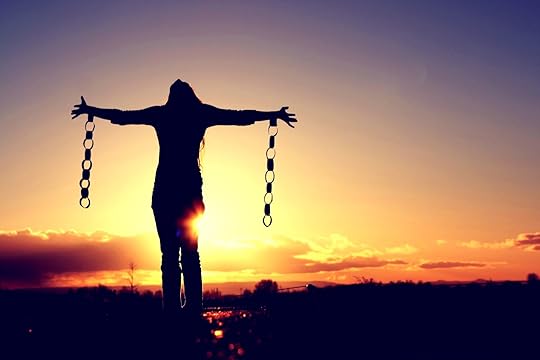 Books have been written about freedom, movies made and songs sung. The concept of freedom, the experience of it, the lack of it, the search for it and the fight for it have filled the hearts and imaginations of people throughout the ages. Freedom and its sibling control are issues which preoccupy mankind, fuelling philosophical debates, and tantalizing those without it.
Books have been written about freedom, movies made and songs sung. The concept of freedom, the experience of it, the lack of it, the search for it and the fight for it have filled the hearts and imaginations of people throughout the ages. Freedom and its sibling control are issues which preoccupy mankind, fuelling philosophical debates, and tantalizing those without it.
Certain freedoms are taken for granted by particular people in specific situations. In democratic nations we have freedom of speech, freedom of religion and freedom of association but these are not without conditions. With rights come responsibilities, and therefore it could easily be argued that there is no such thing as true freedom. There is no scope to debate the point here.
In Asmore Grief, Thuza prayed for freedom. She wanted to get out of the Immigration Detention Centre. However, escaping her incarceration would only free her from a physical prison. The trauma she suffered in there, and on her journey to Australia which she hoped was a journey to freedom, will itself become a jail. Our memories can construct liberty depriving walls around us.
We are only truly free when we realize and accept the fact that we are not as free as we think we are. I’d love to hear your thoughts on freedom? Illusory or real?
Photograph source:http://consciouslifenews.com/covert-o...
“The lights were out in the Christmas Island detention centre. Extinguished as they were each night at 9:30. In much the same way as the hopes of the detainees for freedom were quashed with each sunset. This was her eight day of boredom and relentless depression.
She rolled on her side and stared across the room, visualizing all the other rooms filled with restless bodies. They did nothing to exhaust themselves during the day for there was nothing to do. Often they slept from tedium which made it harder to sleep at night. Thuza imagined muffled conversations of discontent emanating from the shadows as she prayed for deliverance: death or freedom.” From chapter 8, Ashmore Grief
 Books have been written about freedom, movies made and songs sung. The concept of freedom, the experience of it, the lack of it, the search for it and the fight for it have filled the hearts and imaginations of people throughout the ages. Freedom and its sibling control are issues which preoccupy mankind, fuelling philosophical debates, and tantalizing those without it.
Books have been written about freedom, movies made and songs sung. The concept of freedom, the experience of it, the lack of it, the search for it and the fight for it have filled the hearts and imaginations of people throughout the ages. Freedom and its sibling control are issues which preoccupy mankind, fuelling philosophical debates, and tantalizing those without it.Certain freedoms are taken for granted by particular people in specific situations. In democratic nations we have freedom of speech, freedom of religion and freedom of association but these are not without conditions. With rights come responsibilities, and therefore it could easily be argued that there is no such thing as true freedom. There is no scope to debate the point here.
In Asmore Grief, Thuza prayed for freedom. She wanted to get out of the Immigration Detention Centre. However, escaping her incarceration would only free her from a physical prison. The trauma she suffered in there, and on her journey to Australia which she hoped was a journey to freedom, will itself become a jail. Our memories can construct liberty depriving walls around us.
We are only truly free when we realize and accept the fact that we are not as free as we think we are. I’d love to hear your thoughts on freedom? Illusory or real?
Photograph source:http://consciouslifenews.com/covert-o...
Published on April 07, 2014 00:22
April 5, 2014
E is for Escape
E is for Escape
“The air was cool and the car quiet as it motored through along a flat stretch of gun barrel straight highway which sliced through a desert. Malee sat in the front seat and in the back, beside Thuza, another young lady, Vietnamese she believed, called Thi. The final member of their little get away gang was an extremely bashful Aghan woman named Anoosheh. The car was being driven by a man Malee called Ken. The destination was unknown to Thuza but she was not afraid. Malee had won her confidence, earned her trust by protecting her during their time at the detention centre. She knew for certain that she would not have escaped the heinous intentions of some of the male inmates.” From Chapter 10, Ashmore Grief
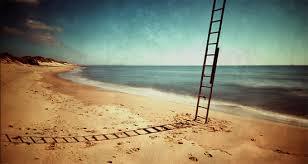 When life becomes a chore, a debilitating bore or when it throws more challenges at us than we can handle we want to flee. We want to run away from the unpleasantness and drudgery, and escape. Fiction is a great escape. When I read a good novel, I get lost in other people’s problems, and temporarily forget my own. If the author has done their job well, then I care about the characters they have created: I worry about them, I fear for them, I laugh and cry with them. I want to know that they will be all right. I desperately want their troubles to end, their problems to be resolved, their fears to be allayed. I hunger for the happy ending, the fairy tale because it reassures me that love can indeed conquer all. It’s possible.
When life becomes a chore, a debilitating bore or when it throws more challenges at us than we can handle we want to flee. We want to run away from the unpleasantness and drudgery, and escape. Fiction is a great escape. When I read a good novel, I get lost in other people’s problems, and temporarily forget my own. If the author has done their job well, then I care about the characters they have created: I worry about them, I fear for them, I laugh and cry with them. I want to know that they will be all right. I desperately want their troubles to end, their problems to be resolved, their fears to be allayed. I hunger for the happy ending, the fairy tale because it reassures me that love can indeed conquer all. It’s possible.
The delusion is powerful: strong enough to propel us through misery or carry us through tragedy. We must have hope. We must believe.The reality is that our lives are characterized by suffering, and no matter what form of escapism we choose, or how intensely we will and wish for it to be otherwise, it doesn't change the fact that for most of us our lives are not as we want them to be. Whatever tools we use to anesthetize ourselves; drugs, alcohol, work, books, movies, video gaming, pornography, or sex, are ultimately mere band-aids. We stagger from one disaster to another, holding on to hope and the ephemeral joy which fills the spaces in between.
In my novel, Thuza fled the frying pan of Christmas Island Detention Centre into an unknown fire, on the strength of a promise that her life would be better. Sometimes there is no escape.
What is your favourite form of escapism?
Photo source:http://thedesigninspiration.com/photo...
“The air was cool and the car quiet as it motored through along a flat stretch of gun barrel straight highway which sliced through a desert. Malee sat in the front seat and in the back, beside Thuza, another young lady, Vietnamese she believed, called Thi. The final member of their little get away gang was an extremely bashful Aghan woman named Anoosheh. The car was being driven by a man Malee called Ken. The destination was unknown to Thuza but she was not afraid. Malee had won her confidence, earned her trust by protecting her during their time at the detention centre. She knew for certain that she would not have escaped the heinous intentions of some of the male inmates.” From Chapter 10, Ashmore Grief
 When life becomes a chore, a debilitating bore or when it throws more challenges at us than we can handle we want to flee. We want to run away from the unpleasantness and drudgery, and escape. Fiction is a great escape. When I read a good novel, I get lost in other people’s problems, and temporarily forget my own. If the author has done their job well, then I care about the characters they have created: I worry about them, I fear for them, I laugh and cry with them. I want to know that they will be all right. I desperately want their troubles to end, their problems to be resolved, their fears to be allayed. I hunger for the happy ending, the fairy tale because it reassures me that love can indeed conquer all. It’s possible.
When life becomes a chore, a debilitating bore or when it throws more challenges at us than we can handle we want to flee. We want to run away from the unpleasantness and drudgery, and escape. Fiction is a great escape. When I read a good novel, I get lost in other people’s problems, and temporarily forget my own. If the author has done their job well, then I care about the characters they have created: I worry about them, I fear for them, I laugh and cry with them. I want to know that they will be all right. I desperately want their troubles to end, their problems to be resolved, their fears to be allayed. I hunger for the happy ending, the fairy tale because it reassures me that love can indeed conquer all. It’s possible.The delusion is powerful: strong enough to propel us through misery or carry us through tragedy. We must have hope. We must believe.The reality is that our lives are characterized by suffering, and no matter what form of escapism we choose, or how intensely we will and wish for it to be otherwise, it doesn't change the fact that for most of us our lives are not as we want them to be. Whatever tools we use to anesthetize ourselves; drugs, alcohol, work, books, movies, video gaming, pornography, or sex, are ultimately mere band-aids. We stagger from one disaster to another, holding on to hope and the ephemeral joy which fills the spaces in between.
In my novel, Thuza fled the frying pan of Christmas Island Detention Centre into an unknown fire, on the strength of a promise that her life would be better. Sometimes there is no escape.
What is your favourite form of escapism?
Photo source:http://thedesigninspiration.com/photo...
Published on April 05, 2014 05:41
April 4, 2014
D is for Darwin
D is for Darwin
“A mouthful of Carlton Draught cleansed his palate and helped him decide against continuing with the steak. He had lied to the waitress, but it was high time he stopped kidding himself. Darwin beckoned. He was due back at Coonawarra where he would be officially deemed fit for a return to duty. He imagined the harbor surrounded by scenic mangroves and pristine tidal waters. It was larger than Sydney harbor and littered with sunken ships from World War II, Cyclone Tracy and confiscated Indonesian fishing vessels: a number of which he had been responsible for in the execution of his duty. Duty. Even the word had a bitter taste so he swallowed more beer to wash it away. At that moment, the thought with which he had been toying, became a definite injunction. It was time to leave the Navy.” - Excerpt from chapter 12 of Ashmore Grief
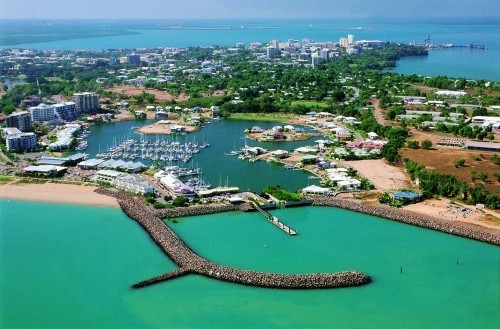 Darwin is the capital city of the Northern Territory in Australia, and is actually closer to Jakarta, Indonesia than Australia’s largest city, Sydney. Founded in 1869, it was named after the famous naturalist, Charles Darwin who visited the then unnamed harbour aboard HMS Beagle in 1839. Although the gold rush caused a temporary boom in Darwin it was events during World War II which put this remote northern town on the map. It was attacked 64 times by the Japanese, with the loss of 231 lives, and was a major base of operations for Allied Forces against the invaders from the north.
Darwin is the capital city of the Northern Territory in Australia, and is actually closer to Jakarta, Indonesia than Australia’s largest city, Sydney. Founded in 1869, it was named after the famous naturalist, Charles Darwin who visited the then unnamed harbour aboard HMS Beagle in 1839. Although the gold rush caused a temporary boom in Darwin it was events during World War II which put this remote northern town on the map. It was attacked 64 times by the Japanese, with the loss of 231 lives, and was a major base of operations for Allied Forces against the invaders from the north.
Famous for crocodiles, beer drinking, no speed limit highways and cyclones, (the worst of which completed destroyed the city in 1974) Darwin offers a relaxed, cosmopolitan, tropical atmosphere, and a wonder land of natural beauty. It has been described as a bustling and beautiful melting pot, and the cultural centre of the alternative Top End lifestyle. It is Australia’s multicultural gateway to Asia.
Although, much of the action in Ashmore Grief takes place in Darwin, I have never been there, but it’s on my list. Writers, what real places have you written about without actually having visited? Readers, what places in Australia are on your "to visit' list?
Further reading:http://www.koalaexpress.com.au/darwin.htm
http://www.nttc.com.au/darwin
“A mouthful of Carlton Draught cleansed his palate and helped him decide against continuing with the steak. He had lied to the waitress, but it was high time he stopped kidding himself. Darwin beckoned. He was due back at Coonawarra where he would be officially deemed fit for a return to duty. He imagined the harbor surrounded by scenic mangroves and pristine tidal waters. It was larger than Sydney harbor and littered with sunken ships from World War II, Cyclone Tracy and confiscated Indonesian fishing vessels: a number of which he had been responsible for in the execution of his duty. Duty. Even the word had a bitter taste so he swallowed more beer to wash it away. At that moment, the thought with which he had been toying, became a definite injunction. It was time to leave the Navy.” - Excerpt from chapter 12 of Ashmore Grief
 Darwin is the capital city of the Northern Territory in Australia, and is actually closer to Jakarta, Indonesia than Australia’s largest city, Sydney. Founded in 1869, it was named after the famous naturalist, Charles Darwin who visited the then unnamed harbour aboard HMS Beagle in 1839. Although the gold rush caused a temporary boom in Darwin it was events during World War II which put this remote northern town on the map. It was attacked 64 times by the Japanese, with the loss of 231 lives, and was a major base of operations for Allied Forces against the invaders from the north.
Darwin is the capital city of the Northern Territory in Australia, and is actually closer to Jakarta, Indonesia than Australia’s largest city, Sydney. Founded in 1869, it was named after the famous naturalist, Charles Darwin who visited the then unnamed harbour aboard HMS Beagle in 1839. Although the gold rush caused a temporary boom in Darwin it was events during World War II which put this remote northern town on the map. It was attacked 64 times by the Japanese, with the loss of 231 lives, and was a major base of operations for Allied Forces against the invaders from the north.Famous for crocodiles, beer drinking, no speed limit highways and cyclones, (the worst of which completed destroyed the city in 1974) Darwin offers a relaxed, cosmopolitan, tropical atmosphere, and a wonder land of natural beauty. It has been described as a bustling and beautiful melting pot, and the cultural centre of the alternative Top End lifestyle. It is Australia’s multicultural gateway to Asia.
Although, much of the action in Ashmore Grief takes place in Darwin, I have never been there, but it’s on my list. Writers, what real places have you written about without actually having visited? Readers, what places in Australia are on your "to visit' list?
Further reading:http://www.koalaexpress.com.au/darwin.htm
http://www.nttc.com.au/darwin
Published on April 04, 2014 00:07
April 3, 2014
C is for Clayfield
C is for Clayfield
“‘Muddy! Let’s go.’
Mark turned to the sound of his crewmate’s voice. He felt sluggish. A poor night sleep had robbed him of vitality. His thoughts were fuzzy.
‘It’s not the bloody orange juice talking to you, mate. Snap out of it.’
Mark marveled at the pulp hovering in the orange liquid.
‘Muddy!’ Again the voice: more urgent. ‘We’re up.’
His reply sounded like it was uttered by someone else, but eventually he rose and donned his blue Navy cap. It bore the embroidered insignia of the RAN: a crown astride an oval bearing the words Royal Australian Navy over a picture of an anchor. As the alert continued to sound, the passageways flooded with personnel. The Albany carried twenty one sailors including Midshipman Clayfield. He climbed the ladder to the deck where he followed the gaze of the assembled crew towards the horizon. A hazy dot bobbed in and out of view.” From chapter 1, Ashmore Grief
 Mark Clayfield is a regular guy, a normal bloke. Some would say he has a pretty cool job. He gets to travel, and he’s doing important work for the country, for national security. On the surface Mark seems like he’s in control and knows what he’s doing. He knows where he’s going. Superficially, everything is okay.
Mark Clayfield is a regular guy, a normal bloke. Some would say he has a pretty cool job. He gets to travel, and he’s doing important work for the country, for national security. On the surface Mark seems like he’s in control and knows what he’s doing. He knows where he’s going. Superficially, everything is okay.
However, Mark, like many people, is going through the motions of life. Something is wrong but he can’t quite put his finger on it. He feels a dissonance, a lack of purpose, and a strange malaise. If he thought about his situation enough, he might even identify the early signs of depression. He needs to change course, but doing so will require courage. It will involve taking a risk, or several risks, and it may invite ridicule or scorn or disappointment from others.
He wants to be a man who makes a difference. He knows if he waits for something to happen, it won’t. He has to move, to be proactive. What will it take?
What are you going to do about your situation?
“‘Muddy! Let’s go.’
Mark turned to the sound of his crewmate’s voice. He felt sluggish. A poor night sleep had robbed him of vitality. His thoughts were fuzzy.
‘It’s not the bloody orange juice talking to you, mate. Snap out of it.’
Mark marveled at the pulp hovering in the orange liquid.
‘Muddy!’ Again the voice: more urgent. ‘We’re up.’
His reply sounded like it was uttered by someone else, but eventually he rose and donned his blue Navy cap. It bore the embroidered insignia of the RAN: a crown astride an oval bearing the words Royal Australian Navy over a picture of an anchor. As the alert continued to sound, the passageways flooded with personnel. The Albany carried twenty one sailors including Midshipman Clayfield. He climbed the ladder to the deck where he followed the gaze of the assembled crew towards the horizon. A hazy dot bobbed in and out of view.” From chapter 1, Ashmore Grief
 Mark Clayfield is a regular guy, a normal bloke. Some would say he has a pretty cool job. He gets to travel, and he’s doing important work for the country, for national security. On the surface Mark seems like he’s in control and knows what he’s doing. He knows where he’s going. Superficially, everything is okay.
Mark Clayfield is a regular guy, a normal bloke. Some would say he has a pretty cool job. He gets to travel, and he’s doing important work for the country, for national security. On the surface Mark seems like he’s in control and knows what he’s doing. He knows where he’s going. Superficially, everything is okay.However, Mark, like many people, is going through the motions of life. Something is wrong but he can’t quite put his finger on it. He feels a dissonance, a lack of purpose, and a strange malaise. If he thought about his situation enough, he might even identify the early signs of depression. He needs to change course, but doing so will require courage. It will involve taking a risk, or several risks, and it may invite ridicule or scorn or disappointment from others.
He wants to be a man who makes a difference. He knows if he waits for something to happen, it won’t. He has to move, to be proactive. What will it take?
What are you going to do about your situation?
Published on April 03, 2014 00:35
April 2, 2014
B is for Battle
B is for Battle
“‘Even if you are accepted as a refugee, there is no guarantee
that you will be permanently resettled in Australia.’
The words were delivered in a harsh and unsympathetic tone by a woman whose countenance bespoke weariness. Thuza physically experienced the lack of emotion. Translated from English, they were soul crushing words in any language. Being told that her claims for asylum would not be processed faster simply because she had jumped the queue, deflated her further. In opposition to the lie told to her by the man she had paid and prostituted herself to, was the truth that there was no advantage in applying for refugee status on Australian soil. It was not a short cut.” – excerpt from chapter 4, Ashmore Grief
 Conflict is a constant staple of most of our lives. We are always fighting something or someone, even if only battling against our own proverbial demons. We struggle for peace and for contentment, as we battle against the system, against injustice, against each other. Some people even seem to enjoy conflict. Whatever private or public war they are waging defines them and brings order and purpose to the lives. We’ve all met people who stagger from one personal disaster to the next, as we look on and wonder why they keep doing that do themselves.
Conflict is a constant staple of most of our lives. We are always fighting something or someone, even if only battling against our own proverbial demons. We struggle for peace and for contentment, as we battle against the system, against injustice, against each other. Some people even seem to enjoy conflict. Whatever private or public war they are waging defines them and brings order and purpose to the lives. We’ve all met people who stagger from one personal disaster to the next, as we look on and wonder why they keep doing that do themselves.
Why do we make life difficult for ourselves? Why do we complicate things? Choose foolish and difficult paths which necessitate battles? Sometimes, for whatever reason, we make bad choices, and then complain about the adverse consequences, or the lack of success. We’re a bit dumb some times, us humans, aren't we?
Life is characterised by conflict. Ashmore Grief explores the struggles we all experience: the struggle to survive, the struggle to find purpose and meaning, and the struggle to belong. The battle will continue until we find ultimate peace in Heaven.
Photo sources:http://jennylincoln.com/team-success/...
“‘Even if you are accepted as a refugee, there is no guarantee
that you will be permanently resettled in Australia.’
The words were delivered in a harsh and unsympathetic tone by a woman whose countenance bespoke weariness. Thuza physically experienced the lack of emotion. Translated from English, they were soul crushing words in any language. Being told that her claims for asylum would not be processed faster simply because she had jumped the queue, deflated her further. In opposition to the lie told to her by the man she had paid and prostituted herself to, was the truth that there was no advantage in applying for refugee status on Australian soil. It was not a short cut.” – excerpt from chapter 4, Ashmore Grief
 Conflict is a constant staple of most of our lives. We are always fighting something or someone, even if only battling against our own proverbial demons. We struggle for peace and for contentment, as we battle against the system, against injustice, against each other. Some people even seem to enjoy conflict. Whatever private or public war they are waging defines them and brings order and purpose to the lives. We’ve all met people who stagger from one personal disaster to the next, as we look on and wonder why they keep doing that do themselves.
Conflict is a constant staple of most of our lives. We are always fighting something or someone, even if only battling against our own proverbial demons. We struggle for peace and for contentment, as we battle against the system, against injustice, against each other. Some people even seem to enjoy conflict. Whatever private or public war they are waging defines them and brings order and purpose to the lives. We’ve all met people who stagger from one personal disaster to the next, as we look on and wonder why they keep doing that do themselves.Why do we make life difficult for ourselves? Why do we complicate things? Choose foolish and difficult paths which necessitate battles? Sometimes, for whatever reason, we make bad choices, and then complain about the adverse consequences, or the lack of success. We’re a bit dumb some times, us humans, aren't we?
Life is characterised by conflict. Ashmore Grief explores the struggles we all experience: the struggle to survive, the struggle to find purpose and meaning, and the struggle to belong. The battle will continue until we find ultimate peace in Heaven.
Photo sources:http://jennylincoln.com/team-success/...
Published on April 02, 2014 03:02
March 31, 2014
A is for Ashmore Grief
A is for Ashmore Grief
‘Bloody birdwatchers, eh?’
Mark nodded and made some noise which he hoped would satisfy his companion on deck, Able Seaman van DeKlyf. The Kimberly Birdwatching tour groups were a familiar site on Ashmore Reef. They visited this National Nature Reserve which comprised three islands bi annually in a luxury catamaran in pursuit of birds. To see them, hear them, photograph them and tick them off a list.
‘Bobbys, Petrells, Shearwaters. Thirty two species.’
Van DeKlyf shook his head. ‘Birds are birds mate. Not that interesting. Not the feathered kind anyway.’
‘You’ve obviously never seen a Masked Bobby then, have you?’
‘You’re full of it, Muddy.’ -excerpt from chapter 3
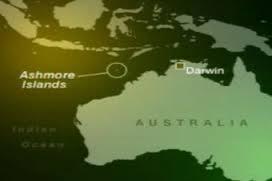 The title of my novel, Ashmore Grief, refers to the three islands comprising Ashmore Reef which together with Cartier Island and the 12 nautical mile sea between them form a distinct territory of Australia. Located 320 km off Australia’s northwest coast, they are uninhabited, mostly covered with coral and sand, and to all extents and purposes is quite insignificant.
The title of my novel, Ashmore Grief, refers to the three islands comprising Ashmore Reef which together with Cartier Island and the 12 nautical mile sea between them form a distinct territory of Australia. Located 320 km off Australia’s northwest coast, they are uninhabited, mostly covered with coral and sand, and to all extents and purposes is quite insignificant.
Apart from the fact that it gets regular mentions in the news because of the fact that it has becme a popular target for people smuggling boats transporting asylum seekers to Australia. Once arrived, the illegal arrivals would claim that they were now in Australian territory and request asylum. Lives have been lost in the pursuit of freedom by desperate people. Boats sink. People drown. They die of illness. This is the human tragedy beneath the political rhetoric. This is the grief to which I refer in the title of my novel.
Other less notorious visitors to these islands include birdwatchers who travel there with special permission on organized tours. The birds are protected by law, and some may argue that more care is shown for their welfare than for the welfare of asylum seekers and refugees.
Read more here: http://www.regional.gov.au/territories/ashmore_cartier/index.aspx
http://en.wikipedia.org/wiki/Ashmore_and_Cartier_Islands
‘Bloody birdwatchers, eh?’
Mark nodded and made some noise which he hoped would satisfy his companion on deck, Able Seaman van DeKlyf. The Kimberly Birdwatching tour groups were a familiar site on Ashmore Reef. They visited this National Nature Reserve which comprised three islands bi annually in a luxury catamaran in pursuit of birds. To see them, hear them, photograph them and tick them off a list.
‘Bobbys, Petrells, Shearwaters. Thirty two species.’
Van DeKlyf shook his head. ‘Birds are birds mate. Not that interesting. Not the feathered kind anyway.’
‘You’ve obviously never seen a Masked Bobby then, have you?’
‘You’re full of it, Muddy.’ -excerpt from chapter 3
 The title of my novel, Ashmore Grief, refers to the three islands comprising Ashmore Reef which together with Cartier Island and the 12 nautical mile sea between them form a distinct territory of Australia. Located 320 km off Australia’s northwest coast, they are uninhabited, mostly covered with coral and sand, and to all extents and purposes is quite insignificant.
The title of my novel, Ashmore Grief, refers to the three islands comprising Ashmore Reef which together with Cartier Island and the 12 nautical mile sea between them form a distinct territory of Australia. Located 320 km off Australia’s northwest coast, they are uninhabited, mostly covered with coral and sand, and to all extents and purposes is quite insignificant.Apart from the fact that it gets regular mentions in the news because of the fact that it has becme a popular target for people smuggling boats transporting asylum seekers to Australia. Once arrived, the illegal arrivals would claim that they were now in Australian territory and request asylum. Lives have been lost in the pursuit of freedom by desperate people. Boats sink. People drown. They die of illness. This is the human tragedy beneath the political rhetoric. This is the grief to which I refer in the title of my novel.
Other less notorious visitors to these islands include birdwatchers who travel there with special permission on organized tours. The birds are protected by law, and some may argue that more care is shown for their welfare than for the welfare of asylum seekers and refugees.
Read more here: http://www.regional.gov.au/territories/ashmore_cartier/index.aspx
http://en.wikipedia.org/wiki/Ashmore_and_Cartier_Islands
Published on March 31, 2014 23:42
March 29, 2014
Bang, where are you?
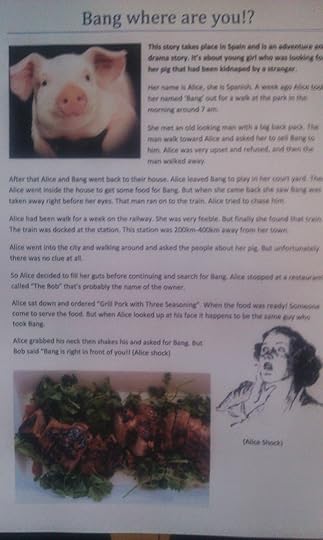 The 2014 A-Z Blogging Challenge is only two days away, so today, as I prepare for the challenge, I just wanted to share this story with you.
The 2014 A-Z Blogging Challenge is only two days away, so today, as I prepare for the challenge, I just wanted to share this story with you.It was written by one of my students, nicknamed Bill, who is 18 and from Thailand. He has recently completed Year 12 year and is studying with me, working on his English language skills, until he begins a course at TAFE.
Bang where are you?
This story takes place in Spain and is an adventure and drama story. It's about a young girl who was looking for her pig that had been kidnapped by a stranger.
Her name is Alice, she is Spanish. A week ago Alice took her pig named 'Bang' out for a walk at the park in the morning around 7am. She met an old looking man with a big back pack. The man walk toward Alice and asked her to sell Bang to him. Alice was very upset and refused, and then the man walked away.
After that Alice and Bang went back to their house. Alice leaved Bang to play in her courtyard. Then Alice went inside to get soem food for bang. But when she came back she saw Bang was taken away right before her eyes. That man ran on to the train. Alice tried to chase him.
Alice had been walk for a week on the railway. She was very feeble. But finally she found that train. The train was docked at the station. This station was 200km-400km away from her town. Alice went into the city and walking around and asked the people about her pig. But unfortunately there was no clue. So Alice decided to fill her guts before continuing and search for bang. Alice stopped at a restaurant called "The Bob" that's probably the name of the owner.
Alice sat down and ordered "grill pork with three seasoning". When the food was ready! Someone come to serve the food. But when Alice looked up at his face it happens to be the same guy who took Bang. Alice grabbed his neck then shakes his and asked for Bang. But Bob said "Bang is right in front of you!! (Alice shock.)
Published on March 29, 2014 14:17
March 22, 2014
When Opportunity Knocks
I've been posting articles here every week for around five years, and last year I wrote 26 in April alone for the A-Z Challenge. Incidentally, I have signed up again for this year's challenge, and I will be posting articles related to my latest novel, Ashmore Grief.
I write to a very small audience whose thoughts are most often unknown to me, and although that is disappointing, I write mainly for myself. I'm not really a mainstream kind of man. I'm a Square Peg who most of the time feels exactly like my tag says, "like I don't really belong." I write because often it is the best way for me to express myself and to explore life as I see it and experience it.
Today, I just want to give some unasked for advice. To those of you who are being presented with an opportunity and you aren't sure if you should take it.
If it sounds good and you want to go for it, then go for it. Imagine how good it could be. Don't think the worst, dream the best. Don't be afraid. Don't confuse fear with prudence. Fear can be a thief.
Open your heart and take a chance because the only way to grow your heart is to share it with others. Grab the opportunity offered to you and watch your heart grow. The more you love, the more you will be able to love. Don't hold back. Don't hide from your feelings.
Happiness is hard to find. If you can find someway to be happy without hurting anybody, including yourself, then don't be a spectator, grab it with both hands and play the game of life. The greater the risk, the greater the reward.
I write to a very small audience whose thoughts are most often unknown to me, and although that is disappointing, I write mainly for myself. I'm not really a mainstream kind of man. I'm a Square Peg who most of the time feels exactly like my tag says, "like I don't really belong." I write because often it is the best way for me to express myself and to explore life as I see it and experience it.
Today, I just want to give some unasked for advice. To those of you who are being presented with an opportunity and you aren't sure if you should take it.
If it sounds good and you want to go for it, then go for it. Imagine how good it could be. Don't think the worst, dream the best. Don't be afraid. Don't confuse fear with prudence. Fear can be a thief.
Open your heart and take a chance because the only way to grow your heart is to share it with others. Grab the opportunity offered to you and watch your heart grow. The more you love, the more you will be able to love. Don't hold back. Don't hide from your feelings.
Happiness is hard to find. If you can find someway to be happy without hurting anybody, including yourself, then don't be a spectator, grab it with both hands and play the game of life. The greater the risk, the greater the reward.
Published on March 22, 2014 12:57



